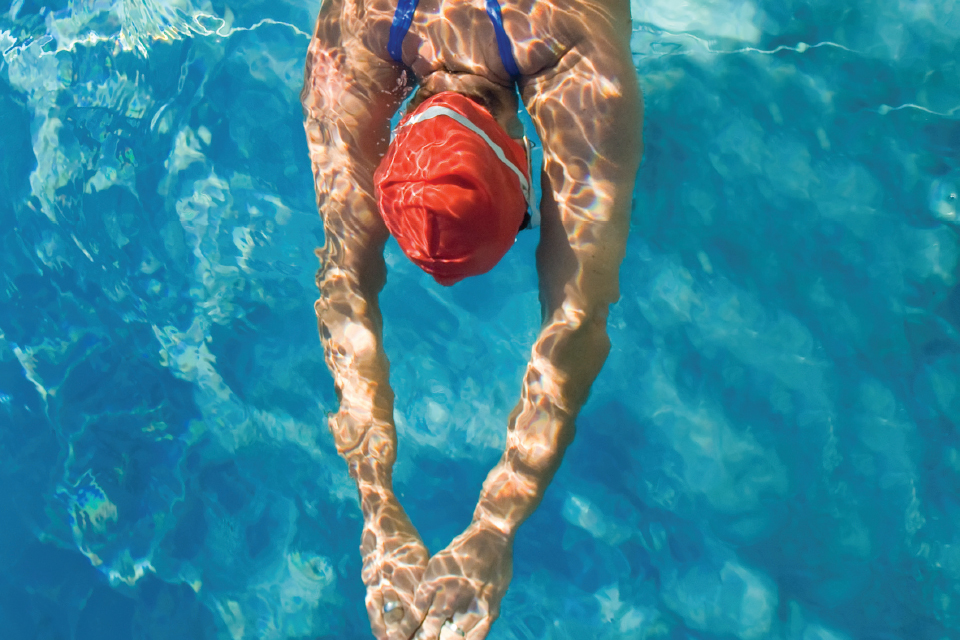Swim with Perspective

One of the most common things I hear from my swim clients is that they are “horrible” swimmers. They make faces when they talk about their swimming; they downgrade their ability; essentially, they badmouth themselves. When I first started teaching adults to swim, my reaction was to think to myself, “Oh, well, that’s why you found me then,” but now I simply listen to their stories, nod politely, and watch them swim to decide for myself. And yet, I have never had clients swim as badly as they’ve described.
Now that I know they are exaggerating, I ignore these negative descriptions. But why are these swimmers so mean to themselves?
More often than not, the people who talk about themselves this way have been really good athletes or high achievers in other walks of life who feel defeated by swimming. When they are not “great” at something, it automatically means they “suck” at it. Beware: words are powerful, and labeling yourself as “sucking” doesn’t help your cause, especially when it comes to swimming—feeding yourself the right diet of positive self-talk can help you relax and gain the confidence you need to overcome anxiety or self-doubt.
I do understand that, for land mammals, swimming might not be fun at first. After all, it is the only sport I can think of where participants have to plan how and when they access oxygen. But people usually have a lot more going for them than they think, and a little change in attitude can make a big difference.
How to Frame Your Swimming in a New Way
You need to change the mantra.
Give credit for where you stand as a swimmer right now. If you’ve never had any instruction before, avoided swimming like the plague, and never really tried to improve and practice, give yourself credit for being able to make it across the pool at all. You’re clearly a natural. Well, OK, maybe that is a stretch for some, but you’re certainly not “horrible.” No one is amazing at something they have never worked at.
Deciding to work at something is not easy, especially for those who only like to do things they’re already good at. Trust me, I get it; I spent most of my childhood not trying new things for fear of “sucking” at them. I felt that everyone expected me to be good at everything just because I was really good at swimming, but of course it doesn’t work like that. If you never take on the challenge of trying new things or never work on areas where natural talent is lacking, you rob yourself of the reward of mastering a new skill and conquering your doubts or anxiety. If you’ve taken the plunge and decided to start practicing swimming, you can rack up more of those credit points. You have taken a small, courageous step toward a new and challenging goal. Good for you.
To get better at swimming, you have to swim. Sounds pretty logical, right? You can’t keep avoiding it. You need to find a way to do it that makes it fun. Use different types of equipment, go with a friend, find a coach or swim program to swim with (swimming is pretty boring on your own unless you like the zen of it). Set small and manageable goals for yourself. Be patient with yourself. If necessary, come up with a reward system for making it to the pool.
Look at this new challenge as a journey. It’s going to take time and perseverance to improve, but you can—and you will—if you work at it. The more you go to the pool, the more comfortable you’ll become in that foreign medium. The more comfortable you are in the water, the more you learn to move through it, work with it, and make it your friend. Think of the water as a place for play, fun, and learning. Think about it—you hardly ever look around a swimming pool and see kids not having fun.
Give yourself credit for where you are right now and for taking on the challenge to improve. Stop being mean to yourself, and start telling yourself you’re a good swimmer who is ready to progress to the next level. Be positive about yourself and your swimming, and prepare to enjoy getting better at it—and then you will.






